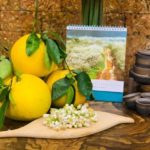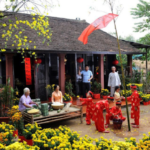Every year, during Tet, especially in northern households, there must be a few new Banh Chung cakes, which are called the arrival of spring. I don’t know when the image of the wrapped Banh Chung has become an indispensable scene every time spring comes.
Indeed, Banh Chung is a cake that must be present every day. Not many like dozens of cakes, but at least five or seven cakes. First for ancestral worship, then for gifting and displaying on the table during the spring days.
When I was in school, everyone knew about the legend of Banh Chung – Banh Day by Lang Lieu and had the idea of gathering with their families to wrap Banh Chung.

What is Banh Chung?
Banh Chung is a square cake symbolizing the square earth, while Banh Day is a round cake symbolizing the sun. Our Vietnamese people belong to a country that follows the culture of rice and water, so we depend a lot on natural factors. That is why Banh Chung has long become an indispensable dish on the ancestral table. All to show gratitude to the heavens and the earth for the abundant harvest.
In addition, the act of wrapping Banh Chung on Tet is also a testament to the filial piety of children to their parents, so the custom of using Banh Chung as a gift to offer to their parents also arises from this. In the past, when wrapping Banh Chung to thank the heavens and the earth for the abundant harvest, Banh Chung for parents is to express gratitude for the birth of their parents.
2. Ingredients for wrapping Banh Chung
Wrapping delicious Banh Chung and boiling Banh Chung for Tet also requires special techniques. The ingredients are also one of the first things that determine whether Banh Chung will taste good or not.
2.1. Choose fresh dong leaves
Dong leaves are used to wrap Banh Chung, covering the outside of the ingredients. Dong leaves used for wrapping Banh Chung should not be too big nor too small. The leaves should not be too young or too old. The leaves should look shiny, dark green, and have small stems. When you find the right dong leaves, wash them clean and dry them in a well-ventilated place. Do not let the leaves dry too much or soak in water.
2.2. Choose sticky rice
Choosing sticky rice to wrap delicious Banh Chung requires using sticky rice that is plump and evenly sized. Soak the sticky rice in cold water for about 10-12 hours, then drain the water and let it dry. Then add the right amount of salt to give the rice a rich flavor.
You may not know, but the characteristic taste of Banh Chung comes from the savory flavor of sticky rice, the aroma of mung beans combined with the fragrant and fatty taste of meat… So the amount of salt added should be just right for the rice, but also enough for the beans and meat.
If you want the sticky rice to be more fragrant, you can use crushed sticky leaves and extract the juice to soak the sticky rice to give it a beautiful color and a more fragrant smell.
2.3. Choose green mung beans
Green mung beans are the nut filling located near the center of the Banh Chung. You can easily find beans that have been peeled or not peeled. If you buy peeled beans, you just need to soak them, if you buy unpeeled beans, you need to soak and peel off the skins before using them.
Although peeling beans takes some time, the beans will be more aromatic and delicious if the skins are intact.
2.4. Tying string
This is the yellow string used to tie Banh Chung. You should choose long bamboo tubes about 70 – 90 cm, remove the outer bark, then split them into equal pieces. Soak the bamboo tubes before splitting them to make them soft, then dry them to make it easier to tie the cakes.
Bamboo tubes will make the Banh Chung cake soft and firm when tied.
2.5. Dried onions and meat
This is one of the final ingredients of Banh Chung. For the filling, choose pork with both lean meat and fat. The fat will make the cake rich and fatty, while the lean meat will bring joy to the new year. Season the meat with just enough spices and sprinkle some pepper to add a fragrant aroma with a light spicy taste.
3. Steps to wrap beautiful square Banh Chung
Preparing the filling and dong leaves for wrapping Banh Chung
- Soak the green beans in water for about 2 hours until they are swollen, then drain and remove any bad beans. Add a spoonful of salt, mix well, and cook until tender. While the beans are still hot, use a spoon to beat the beans until they become smooth, then knead them into evenly sized balls. Note: You can also leave the soaked beans intact, drain them and add salt to wrap.
- Clean the pork belly, cut it into thick slices, about 2cm thick, marinate with enough spices and a little pepper to give the cake a fragrant and light spicy taste when cooked.
- Soak the sticky rice for about 2 hours before wrapping. Then drain the water and mix the rice with salt, be careful to add enough salt to avoid the cake being too bland or too salty.
- If you want the sticky rice to be more fragrant, you can use crushed sticky leaves, strain the juice and soak the sticky rice in it.
- Wash the dong leaves thoroughly on both sides and then dry them in a cool and well-ventilated place. Then, use a knife or scissors to separate the live part of the leaves. A small tip to cut the leaves without tearing them is to cut from the middle of the leaf back towards the stem.

3.1. Method 1: How to wrap Banh Chung without a cross-type mold

Step 1: Place 2 leaves at a right angle to each other with the right side face down, then place another 2 leaves also at a right angle but with the right side facing up.

Step 2: Place a small bowl of rice in the center of the newly arranged leaves.


Step 3: Place the pre-kneaded mung beans (or a large raw mung bean) on top, then place 1-2 pieces of marinated pork belly. Continue with a layer of mung beans and finally a bowl of sticky rice to cover and seal the beans and meat.




Step 4: Fold the right and left dong leaves first. The cake will only be beautiful if it is firmly folded. Tuck any excess leaves inside, and if there is too much excess, you can use scissors to trim it.
Step 5: Use 2 fingers of each hand to squeeze the top dong leaves inside, then fold them while the thumbs still hold the folded leaves from before. Do the same with the other end.
Step 6: After the cake has been formed, use 4 pieces of string to tie the cake, neatly tucking the excess string between the layers. You can also place the 4 strings under the dong leaves from the beginning to prevent the cake from shifting when tying.

After finishing, press lightly with both hands to make the cake firmer.
3.2. Method 2: Wrapping Banh Chung with a quick and beautiful mold

Step 1: Fold each dong leaf into a square corner.
- Choose the darkest leaf as the outer surface of the cake.
- Fold the leaf in half at a right angle to create a folded crease.
- On the lighter surface, about halfway up one side of the leaf at a right angle to the crease, fold it to the left to touch the edge of the creased side, creating one corner of the square box shape.
- Continue to do the same with the remaining 3 dong leaves.

Step 2: Create a square corner-type Banh Chung mold.
- Using the pre-folded dong leaves, stack the second leaf onto the first leaf in a symmetrical manner, with the bottom sides touching each other.
- Continue stacking the third leaf in the same way, with the bottom face parallel to the first leaf and parallel to the second leaf.
- Finally, stack the fourth leaf with the bottom face symmetrical to the third leaf.
- A part of the cake shell is completed under the condition that the mold has been partially formed into half a square box shape.

Step 3: Insert the ingredients into the leaf mold
- First, place a layer of sticky rice, spreading it evenly over the bottom surface.
- Spread the mung beans on top of the rice.
- Continue placing a few pieces of meat on top.
- Finally, cover the filling with another layer of sticky rice.

Step 4: How to wrap Banh Chung using the square-folded leaf mold
- Prepare a string tie at the bottom of the leaf mold to secure it.
- Pull and press the two parallel sides of the folded leaf toward each other, forming two sharp corners.
- Secure the string tie in place.
- Fold the remaining two sharp corners toward each other, evenly and firmly with your hands.
- Take another string tie from the middle, folding it inward at the end, and wrap it tightly to keep the Banh Chung mold from coming apart.
- Tuck the string end under the string tie to secure it.

Step 5: Tie the string to the Banh Chung mold
- Tightly wrap the second string in a perpendicular direction to the first string.
- Tuck the string end into the other string.
- Continue tying tightly and keep the string end under the string tie.

- After completing the above steps, place the Banh Chung cake in a pot.
- Add boiling water to cover the cake.

- Cover tightly and hold the pot lid firmly with a heavy object to prevent the cake from floating above the water surface.
- It is best to boil the cake with medium heat, check the water level once every hour. After the cake is cooked, you can enjoy it right away!
Wishing you success!
Explore 12 Amazing Destinations for Biking Trips
Unlock Vietnam in a brand new way with an exciting biking tour! Discover the stunning beauty of the country with Dien May XANH’s top 12 must-see destinations. From sweeping plains to clear blue beaches and mountainous vistas – experience all the sights with your own personal cycling tour. Find your ideal route and set out for an adventure today!



































